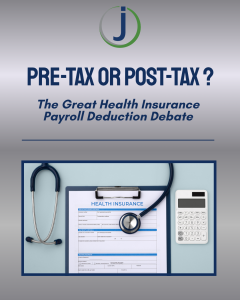Navigating the world of payroll deductions can feel complex and overwhelming, especially without a clear understanding of the rules and requirements. One of the most common questions employers and employees alike grapple with is: Are health insurance premiums deducted pre-tax or post-tax? The answer isn’t always straightforward, but understanding the distinction is crucial for maximizing tax benefits and ensuring compliance.
 Understanding Pre-Tax vs. Post-Tax Deductions
Understanding Pre-Tax vs. Post-Tax Deductions
At its core, the difference between pre-tax and post-tax deductions lies in when the deduction is taken relative to taxation:
- Pre-Tax Premiums: Most employer-sponsored health insurance plans are set up to deduct premiums on a pre-tax basis, especially when integrated into a Section 125 Cafeteria Plan. This arrangement allows employees to pay premiums before taxes are applied, reducing their overall taxable income.
- Post-Tax Premiums: In some cases, employers might deduct health insurance premiums after taxes. This could be due to the specific design of the benefits plan or if the employer doesn’t offer a Section 125 plan. While this doesn’t provide immediate tax savings, employees might be eligible to claim these premiums as itemized deductions on their tax returns, provided they exceed a certain percentage of adjusted gross income.
Benefits of Pre-Tax Deductions
Opting for pre-tax deductions can offer several advantages:
- Tax Savings: Reducing taxable income can lead to significant savings on federal, state, and local taxes.
- Lower Payroll Taxes for Employers: Employers also benefit by paying less in payroll taxes, such as the Federal Unemployment Tax Act (FUTA) and state unemployment taxes. For example, reducing taxable wages through pre-tax deductions can save employers approximately 7.65% in payroll taxes on those wages.
- Enhanced Benefits Offering: Providing pre-tax benefits can make a company’s compensation package more attractive to current and prospective employees.
Considerations and Compliance
While pre-tax deductions offer clear advantages, it’s essential to ensure compliance with IRS regulations:
- Section 125 Cafeteria Plans: To offer pre-tax deductions for health insurance premiums, employers typically need to establish a Section 125 plan. This plan must be documented in writing and comply with specific IRS guidelines.
- Reporting Requirements: Employers are required to report the total costs of employer-sponsored health coverage on employees’ W-2 form; however, this information is provided for informational purposes only and does not affect the taxability of the coverage. This amount includes both the portion paid by the employer and the portion paid by the employee. Importantly, this reporting is for informational purposes only and doesn’t affect the taxability of the coverage.
Conclusion
Determining whether health insurance premiums are deducted pre-tax or post-tax hinges on the structure of the employer’s benefits plan. While pre-tax deductions can offer immediate tax savings for both employees and employers, it’s vital to ensure that the appropriate plans are in place and that all IRS requirements are met. As always, consulting with a tax professional or benefits advisor can provide clarity tailored to specific situations.
Remember, while navigating payroll deductions might not be as thrilling as a roller coaster ride, understanding them can lead to smoother financial journeys for everyone involved.